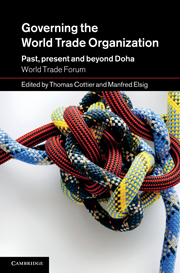Book contents
- Frontmatter
- Contents
- List of figures
- List of tables
- Notes on Contributors
- Preface
- List of abbreviations
- 1 Introduction
- PART I Setting the stage
- PART II Boundaries
- PART III Emerging and established powers
- PART IV Weaker actors
- PART V The consensus principle
- PART VI Quo vadis?
- 12 A post-Montesquieu analysis of the WTO
- 13 Reforming the WTO: the decision-making triangle revisited
- 14 Barriers to WTO reform: intellectual narrowness and the production of path-dependent thinking
- Index
- References
12 - A post-Montesquieu analysis of the WTO
Published online by Cambridge University Press: 07 September 2011
- Frontmatter
- Contents
- List of figures
- List of tables
- Notes on Contributors
- Preface
- List of abbreviations
- 1 Introduction
- PART I Setting the stage
- PART II Boundaries
- PART III Emerging and established powers
- PART IV Weaker actors
- PART V The consensus principle
- PART VI Quo vadis?
- 12 A post-Montesquieu analysis of the WTO
- 13 Reforming the WTO: the decision-making triangle revisited
- 14 Barriers to WTO reform: intellectual narrowness and the production of path-dependent thinking
- Index
- References
Summary
Introduction
In writing The Spirit of Laws in 1748, baron de la Brède et de Montesquieu does not foresee the establishment of the World Trade Organization (WTO) (Montesquieu 1748). Nevertheless, one can employ Montesquieu's methodology to analyse the functions and dysfunctions of the WTO because his cogent framework, although written for the national level, is translatable to the international level of government. Although Montesquieu has been discussed tangentially in WTO scholarship, this chapter places him at the centre of an analysis of how the WTO can be improved.
This chapter is entitled ‘post-Montesquieu’ because it will update Montesquieu's framework in a few important respects. Montesquieu did not anticipate the ubiquity of democracy (much of his book discusses monarchies), the political importance of public participation and the rise of international organisations. More telling, though, is how little of The Spirit of Laws needs to be updated, because of the presence of Montesquieu's spirit in modern political institutions and economic development. Although many scholars anthropomorphise the WTO, I have come to the view that it (like any international organisation) ought to be viewed primarily as a community. The actors in the WTO community are the Members represented by ambassadors, the Director-General (DG), the Secretariat, the private enterprises that trade and civil society. Of course, the WTO still lags behind other major international organisations in providing for ongoing participation by civil society (see Ripinksy and van den Bossche 2007: chapters 11 and 12).
- Type
- Chapter
- Information
- Governing the World Trade OrganizationPast, Present and Beyond Doha, pp. 265 - 288Publisher: Cambridge University PressPrint publication year: 2011
References
- 1
- Cited by



